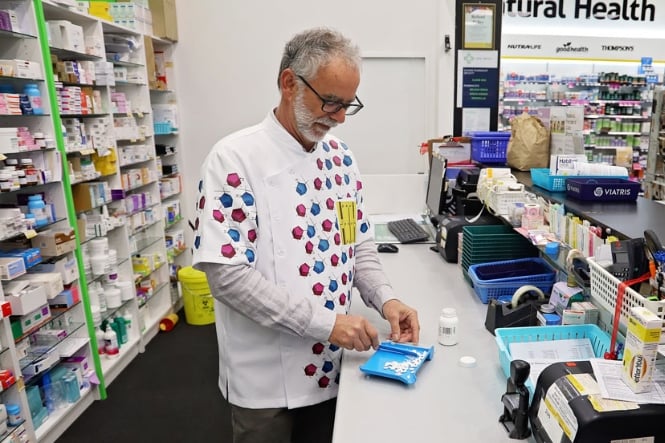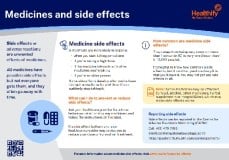Wishing everyone a safe and happy Christmas and New Year – Meri Kirihimete from the Healthify team.
Proton pump inhibitors
Also called PPIs
Key points about proton pump inhibitors
- Proton pump inhibitors are also called PPIs.
- PPIs reduce the amount of acid made by your stomach.
- They’re used as a treatment for reflux and stomach ulcers, or together with medicines such as antibiotics or NSAIDs.
- Use the lowest possible dose for the shortest possible time. Find out how to use PPIs safely.

Examples of PPIs available in Aotearoa New Zealand include:
- lansoprazole (Lanzol Relief®)
- omeprazole (Losec®)
- pantoprazole (Panzop Relief®).
They work by reducing the amount of acid that your stomach produces.
PPIs are available with a prescription written by a prescriber. Omeprazole can be bought in small pack sizes over the counter from a pharmacy.
PPIs reduce the amount of acid made by your stomach. They're used to treat some conditions associated with high stomach acid, such as:
- gastro-oesophageal reflux disease (GORD), which is inflammation of your oesophagus (the food pipe part of your gut) due to stomach acid leaking up (refluxing) from your stomach
- peptic ulcers, which are small holes in the lining of your stomach (called stomach ulcers) or another part of your gut called the duodenum (called duodenal ulcers).
They're also used:
- to prevent ulcers in people who are at risk of getting them, such as people who take NSAIDs (non-steroidal anti-inflammatory drugs) long-term
- together with antibiotics to get rid of the bacteria called Helicobacter pylori, found in your stomach, which can cause ulcers. Most stomach ulcers are caused by a bacteria called Helicobacter pylori, which makes your stomach lining red and inflamed, and more likely to have ulcers
- to treat a rare condition called Zollinger-Ellison syndrome.
They still allow enough acid to be made to digest your food, but by reducing the amount, they allow the oesophagus and stomach lining to heal. PPIs are also prescribed for patients with GORD because, by reducing the amount of acid produced by your stomach, they reduce the burning of your oesophagus.
In Aotearoa New Zealand, PPIs are available as capsules or tablets which come in different strengths.
- Always take your PPI exactly as your healthcare provider has told you. The pharmacy label on your medicine will tell you how much to take, how often to take it and any special instructions.
- The dose of PPI will be different for different people. Your healthcare provider will tell you the dose that's right for you. Your dose of PPI will depend on what it's being used for.
- PPIs are generally safe and well tolerated. However, to reduce the risk of side effects, it's important that you're on the lowest dose possible, for the shortest possible time.
- Depending on your condition, your healthcare provider may prescribe a PPI that you only take when you need to relieve your symptoms, rather than every day. For some people it may be necessary to take a PPI regularly, every day.
- PPIs are available in different strengths. If your capsules or tablets look different to your last supply, talk to your healthcare provider or pharmacist about it.
If you don’t need them, PPIs shouldn't be taken long term, because of the possible side effects. There may be a small increased risk of bone fractures, chest infections, kidney problems, gastric cancer and nutrient deficiencies such as low magnesium and vitamin B12.
If you’ve been taking a PPI for GORD for longer than 4 to 8 weeks, and your symptoms are well controlled, talk to your healthcare provider about reviewing your medicine. They may recommend stepping down your treatment. This could include:
- reducing your daily dose of medicine
- taking your medicine only when you experience any symptoms of heartburn and reflux (also known as on-demand therapy)
- stopping treatment completely as your symptoms may not return. It may be best to reduce the dose over a few weeks before stopping.
Will my symptoms return if I stop my PPI?
When PPIs are stopped, a common side effect is rebound acid secretion, where the acid secretion (production) in your stomach increases. This should return to normal within 2 weeks.
Because the symptoms of rebound acid secretion are the same as for GORD (such as indigestion, discomfort and pain in your upper stomach and chest, feeling sick and an acid taste in your mouth), it can form an ongoing loop where stopping your PPI can make you feel like you need to start it again.
Rather than restarting your PPI, your healthcare provider may advise you to use medicines that contain both an antacid and an anti-foaming agent, such as Acidex oral liquid or Gaviscon Double Strength tablets. Alternatively, ranitidine tablets can be used. These can be effective for treating rebound acid secretion. You can use these medicines to relieve the symptoms when they occur.
Talk to your healthcare provider or pharmacist about how to manage rebound acid secretion.
Read more about side effects of lansoprazole, omeprazole and pantoprazole.
The following links provide further information about PPIs. Be aware that websites from other countries may have information that differs from New Zealand recommendations.
Proton Pump Inhibitors(external link) Patient, UK
Brochures
Medicines and side effects(external link) Healthify He Puna Waiora, NZ, 2024
5 questions to ask about your medications(external link) Health Quality and Safety Commission, NZ, 2019 English(external link), te reo Māori(external link)
References
- Proton pump inhibitors(external link) New Zealand Formulary
- Lansoprazole(external link) New Zealand Formulary
- Omeprazole(external link) New Zealand Formulary
- Pantoprazole(external link) New Zealand Formulary
- Proton pump inhibitors and rebound acid hypersecretion – A recurring issue(external link) Medsafe, NZ, 2019
- Stopping proton pump inhibitors in older people(external link) BPAC, NZ, 2019
- H. pylori: who to test and how to treat(external link) BPAC, NZ, 2022 (external link)
- Small risk of gastric cancer with long term use of PPI(external link) Goodfellow Gems, NZ, 2022
Brochures

Medicines and side effects
Healthify He Puna Waiora, NZ, 2024

Health Quality and Safety Commission, NZ, 2019 English, te reo Māori
Credits: Healthify editorial team. Healthify is brought to you by Health Navigator Charitable Trust.
Reviewed by: Stephanie Yee, Pharmacist, Auckland.
Last reviewed:





